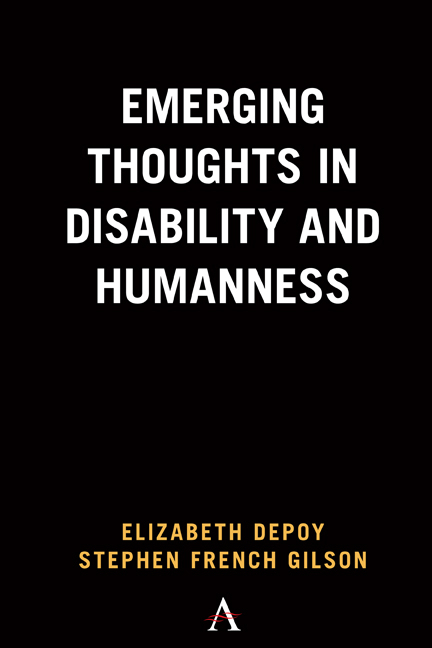Chapter 1 - Legitimate and Offending Bodies
Published online by Cambridge University Press: 13 May 2022
Summary
Disability has the radical potential to trouble the normative, rational, independent, autonomous subject that is so often imagined when the human is evoked.
—Goodley and Brunswick-Cole (2014, 2)Answers to the question “what is legitimate and desirable humanness” is not banter one might hear in public. But, nonetheless, embodied desirability, what we accept as “the good life” for ourselves, compared to the other who does not fit, and what humanness elements we propose as the object of scrutiny, fixing, or elimination inhere in the commercial, cultural, medical, and social ether of daily life. Holding the hand of the “disabled being” as alter, this book materializes shrouded history and current literature on disability illustrated by thoughts and praxis, exposing the legitimate human and its opposite. Beyond theorizing for its own aggrandizement, we seek a purpose of provoking thought as the basis for informed action.
For over 40 years, the impairment definition of disability and its associate, age-related decline, referred to as the medical model, have been pommeled by disability studies and aging scholars. Early social theorists focused on and wrested disability away from the impaired body and located it in the terrain of social, attitudinal, political, economic, and even spiritual discrimination (Rembis et al., 2018). Aging theorists recolored Eriksonian notions of reflection and withdrawal from life into a vibrant conclusion chapter in which medical notions of disability, albethey present, were typical but incidental to productive contribution (Lawrence-Lightfoot, 2009; Erikson, 1959). These analyses, including our own thinking, were concerned with the what and how of disability. The what is a definitional debate (Momm & Geiecker, (2011). Scholars ask “is disability a decrepit embodied phenomenon,” a fait accompli as one moves beyond halfcentury lived, a social arrangement begetting discrimination, a profit motif, an abrogation of rights, and then provide answers that increase in complexity and bleed into other essentialist intersections about similar questions surrounding human difference and the atypical. Defining what disability is is not a trivial pursuit in that the “what” beckons the how, or the response.
Different from the impairment or medical model which invites professional surveillance and control, the social model requests change from all but the impaired body. Integrating and activating impairment within a hostile context creates a three-dimensional (3D) canvas on which complex responses can be drawn and offered.
- Type
- Chapter
- Information
- Emerging Thoughts in Disability and Humanness , pp. 3 - 8Publisher: Anthem PressPrint publication year: 2022



